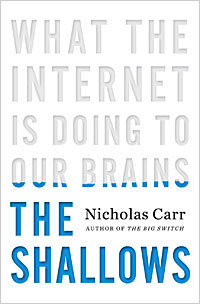In Nicholas Carr’s book The Shallows, he has a fascinating section on the difference between reading online and reading offline, which supplements some of the observations I made in my Touchstone article ‘Scripture in the Age of Google.’ The study Carr sites can be found here.
In 2008, Small and two of his colleagues carried out the first experiment that actually showed people’s brains changing in response to Internet use. The researchers recruited twenty-four volunteers – a dozen experienced Web surfers and a dozen novices – and scanned their brains as they performed searches on Google. (Since a computer won’t fit inside a magnetic resonance imagers, the subjects were equipped with goggles onto which were projected images of Web pages, along with a small handheld touchpad to navigate the pages.) The scans revealed that the brain activity of the experienced Googlers was much broader than that of the novices. In particular, “the computer-savvy subjects used a specific network in the left front part of the brain, known as the dorsolateral prefrontal cortex, [while] the Internet-naïve subject showed minimal, if any, activity in this area.” As a control for the test, the researchers also had the subjects read straight text in a simulation of book reading; in this case, scans revealed no significant difference in brain activity between the two groups. Clearly, the experienced Net users’ distinctive neural pathways had developed through their Internet use.
The most remarkable part of the experiment came when the tests were repeated six days later. In the interim, the researchers had the novices spend an hour a day online, searching the Net. The new scans revealed that the area in their prefrontal cortex that had been largely dormant now showed extensive activity–just like the activity in the brains of the veteran surfers. “After just five days of practice, the exact same neural circuitry in the front part of the brain became active in the Internet-naïve subjects,” reports Small. “Five hours on the internet, and the naïve subjects had already rewired their brains.” He goes on to ask, “If our brains are so sensitive to just an hour a day of computer exposure, what happens when we spend more time [online]?”
One other finding of the study sheds light on the differences between reading Web pages and reading books. The researchers found that when people search the Net they exhibit a very different pattern of brain activity than they do when they read book-like text. Book readers have a lot of activity in regions associated with language, memory, and visual processing, but they don’t display much activity in the prefrontal regions associated with decision making and problem solving. Experienced Net users, by contrast, display extensive activity across all those brain regions when they scan and search Web pages. The good news here is that Web surfing, because it engages so many brain functions, may help keep older people’s minds sharp. Searching and browsing seem to ‘exercize’ the brain in a way similar to solving crossword puzzles, says Small.
But the extensive activity in the brains of surfers also points to why deep reading and other acts of sustained concentration become so difficult online. The need to evaluate links and make related navigational choices, while also processing a multiplicity of fleeting sensory stimuli, requires constant mental coordination and decision making, distracting the brain from the work of interpreting text or other information. Whenever we, as readers, come upon a link, we have to pause, for at least a split second, to allow our prefrontal cortex to evaluate whether or not we should click on it. The redirection of our mental resources, from reading words to making judgments, may be imperceptible to us–our brains are quick–but it’s been shown to impede comprehension and retention, particularly when it’s repeated frequently. As the executive functions of the prefrontal cortex kick in, our brains become not only exercised but overtaxed.


 In 2008, Small and two of his colleagues carried out the first experiment that actually showed people’s brains changing in response to Internet use. The researchers recruited twenty-four volunteers – a dozen experienced Web surfers and a dozen novices – and scanned their brains as they performed searches on Google. (Since a computer won’t fit inside a magnetic resonance imagers, the subjects were equipped with goggles onto which were projected images of Web pages, along with a small handheld touchpad to navigate the pages.) The scans revealed that the brain activity of the experienced Googlers was much broader than that of the novices. In particular, “the computer-savvy subjects used a specific network in the left front part of the brain, known as the dorsolateral prefrontal cortex, [while] the Internet-naïve subject showed minimal, if any, activity in this area.” As a control for the test, the researchers also had the subjects read straight text in a simulation of book reading; in this case, scans revealed no significant difference in brain activity between the two groups. Clearly, the experienced Net users’ distinctive neural pathways had developed through their Internet use.
In 2008, Small and two of his colleagues carried out the first experiment that actually showed people’s brains changing in response to Internet use. The researchers recruited twenty-four volunteers – a dozen experienced Web surfers and a dozen novices – and scanned their brains as they performed searches on Google. (Since a computer won’t fit inside a magnetic resonance imagers, the subjects were equipped with goggles onto which were projected images of Web pages, along with a small handheld touchpad to navigate the pages.) The scans revealed that the brain activity of the experienced Googlers was much broader than that of the novices. In particular, “the computer-savvy subjects used a specific network in the left front part of the brain, known as the dorsolateral prefrontal cortex, [while] the Internet-naïve subject showed minimal, if any, activity in this area.” As a control for the test, the researchers also had the subjects read straight text in a simulation of book reading; in this case, scans revealed no significant difference in brain activity between the two groups. Clearly, the experienced Net users’ distinctive neural pathways had developed through their Internet use.